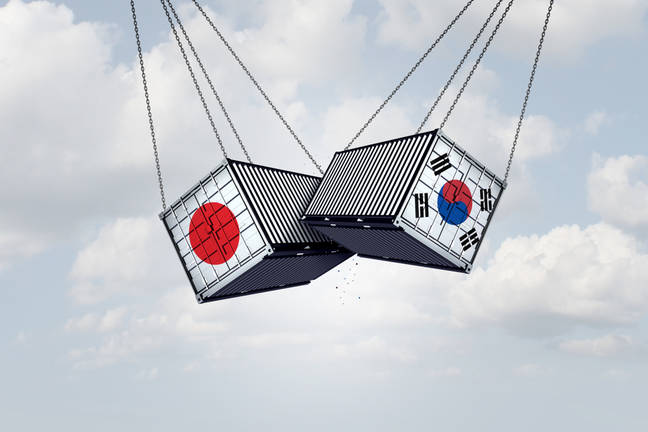South Korea Joins The Were Going To Be Self-sufficient In More Tech And Then Export Bucketloads Club

South Korea has become the latest nation to decide that it should become more self-sufficient in key technologies and by doing so turn itself into an exporter.
Japan is the main target of this renewed effort, which began last year when South Korea named 100 products it wanted to start making itself without the help of its neighbour. South Korean president President Moon Jae-in yesterday declared that effort a success and cited local production of hydrogen fluoride – a gas used in semiconductor manufacturing - as an example of having quickly removed dependence on Japan and, with help from foreign investors, becoming a global supplier.
He therefore announced that South Korea’s list of stuff it wants to make without help has been expanded to 338 items.
President Moon was blunt in stating that the plan is designed to take advantage of expected post-pandemic changes to global supply chains.
“By turning the crisis into an opportunity, we will leap forward to become a powerful nation for the material, parts and equipment sectors,” the president said. “At the same time, we need to cooperate with the international community to stabilize the global supply chain.”
Or in other words, South Korea plans to become an alternative to current suppliers of many technologies, then sell them through current trade agreements. And will do so in the name of supply chain diversification because the world has woken up the problem of having so much stuff made in China that an emergency there slows the global economy.
“We will quickly respond to changes in the supply chain by establishing a'digital supply chain' and a 'smart logistics system', and reduce the cost and time of developing new materials by more than 70% with the ‘material innovation AI platform’,” the president told a crowd at a factory operated by local semiconductor concern SK Hynix. That location was no accident:
South Korea is not alone in using the pandemic to make a play for global tech markets: India is aggressively pursuing a plan of self-reliance as way to attract investment that builds an electronics industry of such scale that it can win export business. Other nations had similar goals before COVID-19 came along: Donald Trump has called for fewer imports of almost every conceivable commodity and China aims to become self-sufficient in silicon as soon as possible. ®
From Chip War To Cloud War: The Next Frontier In Global Tech Competition
The global chip war, characterized by intense competition among nations and corporations for supremacy in semiconductor ... Read more
The High Stakes Of Tech Regulation: Security Risks And Market Dynamics
The influence of tech giants in the global economy continues to grow, raising crucial questions about how to balance sec... Read more
The Tyranny Of Instagram Interiors: Why It's Time To Break Free From Algorithm-Driven Aesthetics
Instagram has become a dominant force in shaping interior design trends, offering a seemingly endless stream of inspirat... Read more
The Data Crunch In AI: Strategies For Sustainability
Exploring solutions to the imminent exhaustion of internet data for AI training.As the artificial intelligence (AI) indu... Read more
Google Abandons Four-Year Effort To Remove Cookies From Chrome Browser
After four years of dedicated effort, Google has decided to abandon its plan to remove third-party cookies from its Chro... Read more
LinkedIn Embraces AI And Gamification To Drive User Engagement And Revenue
In an effort to tackle slowing revenue growth and enhance user engagement, LinkedIn is turning to artificial intelligenc... Read more

